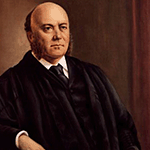
Horace Gray (1882-1902)
Horace Gray lived from 1828 to 1902.
Early Life and Legal Career
Gray was born in Boston, Massachusetts on March 24, 1828 to one of Boston’s most elite merchant families. His father, William Gray, was at one time considered the richest man in New England. Gray enrolled at Harvard College at the age of 13, graduating just four years later. Following graduation, he began studying law at Harvard but never received a degree. Nonetheless, Gray was admitted to the bar in 1851.
In 1854, Gray was named Reporter of Decisions for the Massachusetts Supreme Judicial Court. Although he was young, Gray excelled in the position, earning a respectable reputation as a scholar and legal historian. Ten years later, at the age of 36, Gray was appointed to the Massachusetts Supreme Judicial Court as an Associate Justice, making him the youngest appointee in the court’s history. In 1873, Gray became Chief Justice of the Court, a position he held until his appointment to the U.S. Supreme Court.
Appointment to the Supreme Court
In 1881, Gray was nominated to the Supreme Court to serve as an Associate Justice by President Chester A. Arthur. Gray was one of few Supreme Court appointees in the latter half of the 19th century who had not previously served as politicians; he maintained the opinion that law and politics were entirely separate fields.
Gray is well known for his opinion in Mutual Life Insurance Co. of N.Y. v. Hillmon, in which he held that a declarant’s out-of-court statement of his intention to do something or go somewhere in the future is admissible under the “state-of-mind” hearsay exception. Gray also penned the opinion in the case United States v. Wong Kim Ark. In Wong Kim Ark, the court ruled that “a child born in the United States to parents of Chinese descent, who, at the time of his birth, are subjects of the Emperor of China, but have a permanent domicile and residence in the United States, and are there carrying on business, and are not employed in any diplomatic or official capacity under the Emperor of China, becomes at the time of his birth a citizen of the United States.” In the infamous case of Plessy v. Ferguson, which upheld racial segregation, Gray also sided with the majority.
Notably, Gray became the first Justice of the U.S. Supreme Court to hire a law clerk. He paid the clerk with his own funds, as government money was not appropriated for this purpose at he time.
Death and Legacy
In 1902, after falling gravely ill, Gray was forced to resign from the Supreme Court. He died later that same year.
Notable Cases
United States v. Wong Kim Ark
Mut. Life Ins. Co. of N.Y. v. Hillmon







